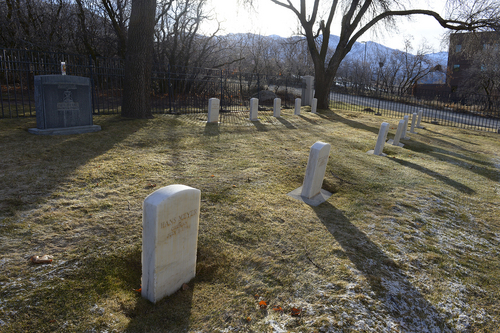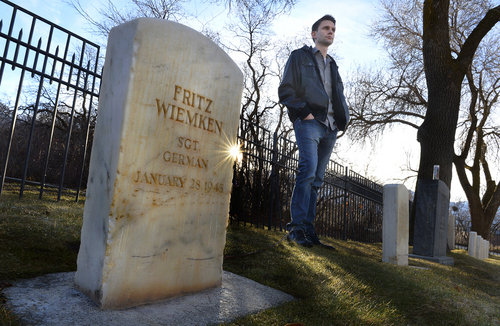This is an archived article that was published on sltrib.com in 2014, and information in the article may be outdated. It is provided only for personal research purposes and may not be reprinted.
Scott Porter stood beside the iron cross and swastika-adorned gravestone of German Army Cpl. Paul Eilert.
Then Porter pointed at the headstone for German Army Sgt. Fritz Wiemken. He died of a brain tumor.
Porter wasn't strolling through a war memorial in Berlin or Hamburg. Eilert and Wiemken are two of 20 German prisoners of war buried at the Fort Douglas Cemetery in Salt Lake City.
About 8,000 German POWs were sent to Utah during World War II. Porter, a 30-year-old video producer for Usana, is making a one-hour film about the prisoners' experiences he calls "Splinters of a Nation."
He said he's already raised about $100,000 from nonprofits and individuals. He is seeking another $20,000 through a Kickstarter campaign that ends Thursday.
The documentary is well underway. Last year, Porter traveled to Germany to interview some of the prisoners held in Utah.
"That's half the story," Porter said. "The other half is here in Utah."
Besides donations, Porter is seeking Utahns who interacted with the POWs and have stories to tell. Porter already has one witness: his grandmother.
German POWS, under guard by U.S. troops, worked on her family's farm near Lewiston. There are similar stories of prisoners working on farms across northern Utah.
But Porter says he's missing two big pieces of the POWs' Utah story: U.S. soldiers who guarded the Germans and anyone who was present in Salina on July 8, 1945.
That was the morning U.S. Army Pvt. Clarence V. Bertucci, of New Orleans, climbed into a guard tower and fired a machine gun into the tents below where the prisoners were sleeping. Nine Germans died and 19 more were wounded.
"So far, we don't have any living account" of the massacre, Porter said.
As gruesome as the Salina massacre was, Porter says the research he was able to find, much of it based on the work of Utah historian Allan Kent Powell, as well as the interviews in Germany, indicates the POWs were treated well in Utah. About 7,000 Italian prisoners came to Utah, too, but most of them agreed to support the Allied war effort by joining Italian Service Units and taking civilian jobs in exchange for increased freedom in the United States.
German POWs were not given that option. For those who worked on farms, the labor could be grueling, especially when picking sugar beets. At night they returned to camps, Porter says. In the case of the prisoners who worked on his grandmother's farm, those POWs stayed in a camp at the Cache County fairgrounds.
Kurt Schnepper, one of the German POWs, told Porter that the prisoners even adopted some American ideologies while in Utah.
"It was very interesting for us," Schnepper told Porter, according to translated transcripts of his interviews he provided to The Salt Lake Tribune. "How America is governed and democracy was practiced. ... We adopted this attitude already in the camp. We didn't want to have anything more to do with the Nazis. It was part of history."
Porter said a public television station has agreed to broadcast the film in 2015 with the coinciding of 70th anniversary of World War II's end.
Twitter: @natecarlisle —
'Splinters of a Nation'
Anyone with memories, photographs or film of the German prisoners in Utah can contact Scott Porter at http://www.splintersofanation.com or https://www.facebook.com/splintersofanation.







